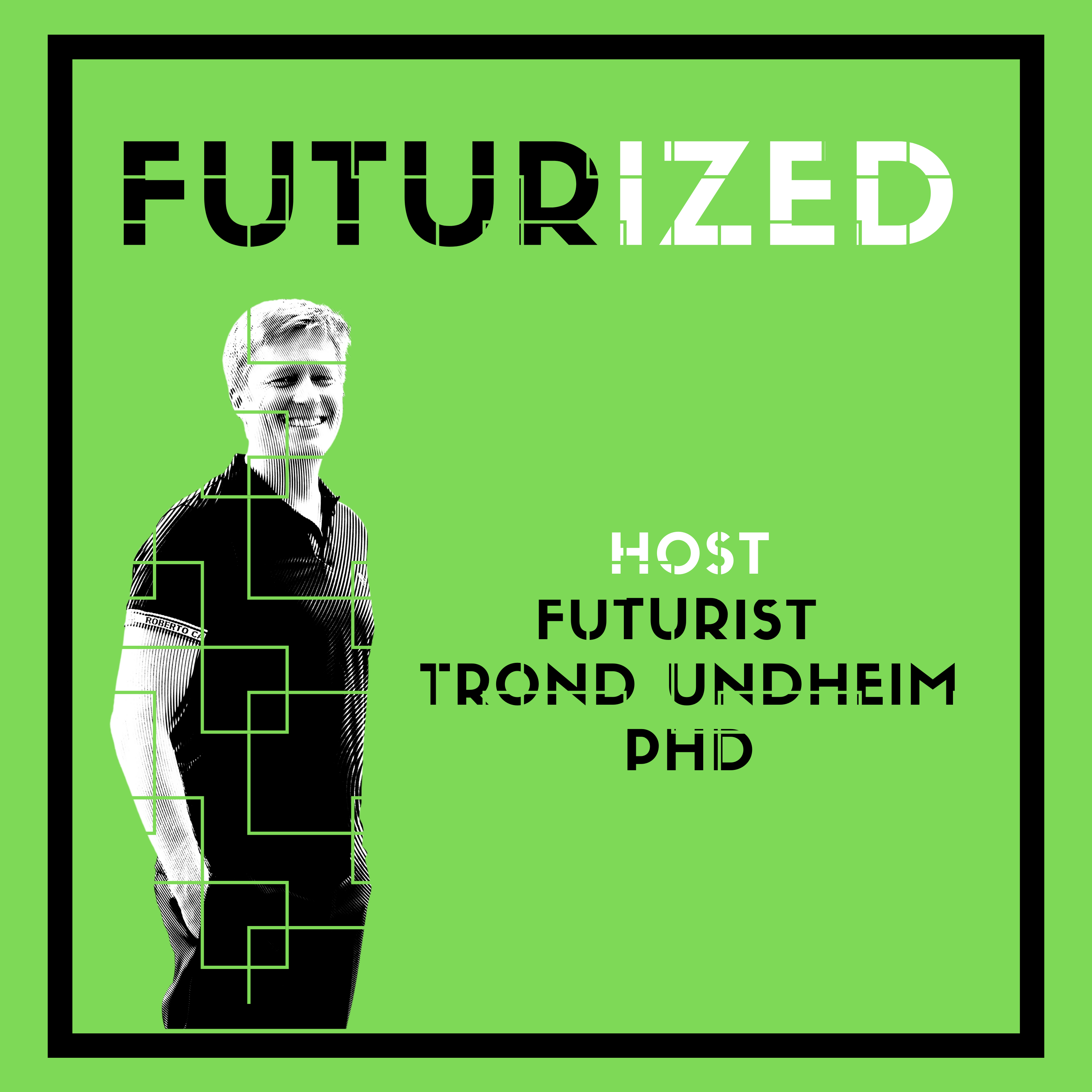
295.5K
Downloads
193
Episodes
The Futurized podcast goes beneath the trends, tracking the underlying forces of disruption in tech, policy, business models, social dynamics, and the environment. Futurist Trond Arne Undheim, PhD, author, investor, and serial entrepreneur, interviews smart people with a soul. Every week, founders, authors, executives and other thought leaders come on the show to discuss the societal impact of deep tech (e.g. AI, blockchain, IoT, CRISPR, nanotech, 3D printing, quantum, robotics) and the emerging future of work, markets, business and society.
The Futurized podcast goes beneath the trends, tracking the underlying forces of disruption in tech, policy, business models, social dynamics, and the environment. Futurist Trond Arne Undheim, PhD, author, investor, and serial entrepreneur, interviews smart people with a soul. Every week, founders, authors, executives and other thought leaders come on the show to discuss the societal impact of deep tech (e.g. AI, blockchain, IoT, CRISPR, nanotech, 3D printing, quantum, robotics) and the emerging future of work, markets, business and society.
Episodes

Tuesday Sep 07, 2021
The Future of Entertainment
Tuesday Sep 07, 2021
Tuesday Sep 07, 2021
Futurized goes beneath the trends to track the underlying forces of disruption in tech, policy, business models, social dynamics and the environment.
I’m your host, Trond Arne Undheim (@trondau), futurist, author, investor, and serial entrepreneur. Join me as I discuss the societal impact of deep tech such as AI, blockchain, IoT, nanotech, quantum, robotics, and synthetic biology, and tackle topics such as entrepreneurship, trends, or the future of work. On the show, I interview smart people with a soul: founders, authors, executives, and other thought leaders, or even the occasional celebrity.
Futurized is a bi-weekly show, preparing YOU to think about how to deal with the next decade's disruption, so you can succeed and thrive no matter what happens. Futurized—conversations that matter.
In episode 133 of the podcast, the topic is: The Future of Entertainment. Our guest is Brimstone, entrepreneur, professional wrestler, radio host, actor, author, musician, philanthropist, food critic, as well as a video game hero--and much more. After listening to the episode, check out:
- Brimstone (@entrancetohell): https://www.therealbrimstone.com/
In this conversation, we talk about what the next decade looks like in Brimstone's sphere of entertainment, comics, and wrestling. Entertainment has been here since the beginning of time, from storytelling around the bonfire, to hunting, to Greek theater to gladiators. Everywhere we go, it is about entrancing an audience and standing out from the competition by being unique. What does the future hold? What can all of us learn from a master entertainer?
If you're new to the show, seek particular topics, or you are looking for a great way to tell your friends about the show, which we always appreciate, we've got the episode categories. Those are at Futurized.org/episodes. They are collections of your favorite episodes organized by topic, such as Entrepreneurship, Trends, Emerging Tech, or The Future of Work. That'll help new listeners get a taste of everything that we do here, starting with a topic they are familiar with, or want to go deeper in.
The host of this podcast, Trond Arne Undheim, Ph.D is the author of Health Tech: Rebooting Society's Software, Hardware and Mindset--published by Routledge in 2021, Future Tech: How to Capture Value from Disruptive industry Trends--published by Kogan Page in 2021, Pandemic Aftermath: how Coronavirus changes Global Society and Disruption Games: How to Thrive on Serial Failure (2020)--both published by Atmosphere Press in 2020, Leadership From Below: How the Internet Generation Redefines the Workplace by Lulu Press in 2008. For an overview, go to Trond's Books at Trondundheim.com/books
At this stage, Futurized is lucky enough to have several sponsors. To check them out, go to Futurized.org/sponsors.
If you are interested in sponsoring the podcast, or to get an overview of other services provided by the host of this podcast, including how to book him for keynote speeches, please go to Store | Futurized - thoughts on our emerging future. We will consider all brands that have a demonstrably positive contribution to the future.
Before you do anything else, make sure you are subscribed to our newsletter on Futurized.org, where you can find hundreds of episodes of conversations that matter to the future. I hope you can also leave a positive review on iTunes or in your favorite podcast player--it really matters to the future of this podcast.
You have just listened to episode 133 of the Futurized podcast, with host Trond Arne Undheim, futurist and author. If you are interested in Trond's products or services, feel free to check out Futurized.org/store, where you can book a keynote speech, become a sponsor or partner, request a podcast swap, or buy a few of Trond's books, such as Health Tech, Future Tech, Pandemic Aftermath, Disruption Games or Leadership From Below. If you are interested in all of Trond's projects, check out his website, Trondundheim.com which has links to his other podcasts as well as his public appearances.
In this conversation, we talked about what the next decade looks like in Brimstone's sphere of entertainment, comics, and wrestling.
Trond's takeaway: The future of entertainment is still about providing a standout performance and building a brand around your personality coupled with your products and services. It is encouraging to learn that entertaining can be rehearsed by anybody, regardless of personality. But rest assured, there is only one Brimstone, this larger than life character, and only one show like Futurized.
Thanks for listening. If you liked the show, subscribe at Futurized.org or in your preferred podcast player, and rate us with five stars.
If you like this topic, you may enjoy other episodes of Futurized, such as episode 107, The Future of Art and Tech, episode 80, The Future of Personal Development, or episode 54, The Future of AR. Hopefully, you'll find something awesome in these or other episodes. If so, do let us know by messaging us, we would love to share your thoughts with other listeners.
Futurized is created in association with Yegii, the insight network. Yegii lets clients create multidisciplinary dream teams consisting of a subject matter experts, academics, consultants, data scientists, and generalists as team leaders. Yegii's services include speeches, briefings, seminars, reports and ongoing monitoring. You can find Yegii at Yegii.org.
The Futurized team consists of podcast host and sound technician Trond Arne Undheim, videographer Raul Edward D'Trewethan, and podcast marketer Nahin Israfil Hossain.
Please share this show with those you care about. To find us on social media is easy, we are Futurized on LinkedIn and YouTube and Futurized2 on Instagram and Twitter:
- Instagram: https://www.instagram.com/futurized2/
- Twitter (@Futurized2): https://twitter.com/Futurized2
- Facebook: https://www.facebook.com/Futurized-102998138625787
- LinkedIn: https://www.linkedin.com/company/futurized
- YouTube: https://www.youtube.com/Futurized
- Podcast RSS: https://feed.podbean.com/www.futurized.co/feed.xml
See you next time. Futurized—conversations that matter.
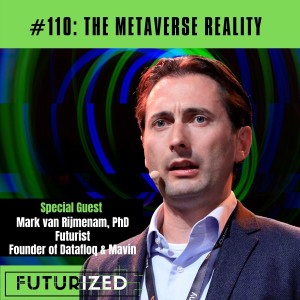
Monday Aug 30, 2021
The Metaverse Reality
Monday Aug 30, 2021
Monday Aug 30, 2021
Futurized goes beneath the trends to track the underlying forces of disruption in tech, policy, business models, social dynamics and the environment. I’m your host, Trond Arne Undheim, futurist and author. In episode #110 of the podcast, the topic is: The Metaverse Reality. Our guest is Mark van Rijmenam, PhD, Futurist, Founder of Datafloq & Mavin.
In this conversation, we talk about [the organization of tomorrow, the increasing blending of online and offline worlds, reality and virtual reality, into a hybrid reality. In the metaverse, we might find sovereign identities where people and bots work, play, learn and consume, operating in an increasingly virtually empowered world. We discuss the potential of an impending productization of that hybrid reality with unforeseeable consequences.
Before you do anything else, make sure you are subscribed to our newsletter on Futurized.org, where you can find hundreds of episodes of conversations that matter to the future. I hope you can also leave a positive review on iTunes or in your favorite podcast player--it really matters to the future of this podcast. Thanks so much, let's begin.
After listening to the episode, check out:
- Mark van Rijmenam (@VanRijmenam): https://thedigitalspeaker.com/
Trond's takeaway: The metaverse, for all the hype, is just another version of the internet. It might be a badly designed version, though, and that is not helpful. The upside, perhaps, is that as people embrace virtual worlds they might get some needed break from a tough reality. However, at the moment, the metaverse is looking like it will be productized way early in its lifecycle and that will limit the creation of the kind of innovation space that spurred the internet into a broad humanity expanding platform.]
Thanks for listening. If you liked the show, subscribe at Futurized.org or in your preferred podcast player, and rate us with five stars.
If you like this topic, you may enjoy other episodes of Futurized, such as episode #101, The Future of Consciousness, episode #54, The Future of AR, or episode #68, Industrial-grade Mixed Reality.
To find us on social media:
- Instagram: https://www.instagram.com/futurized2/
- Twitter (@Futurized2): https://twitter.com/Futurized2
- Facebook: https://www.facebook.com/Futurized-102998138625787
- LinkedIn: https://www.linkedin.com/company/futurized
- YouTube: https://www.youtube.com/Futurized
- Podcast RSS: https://feed.podbean.com/www.futurized.co/feed.xml
Futurized—conversations that matter.
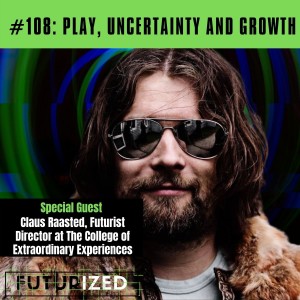
Tuesday Aug 24, 2021
Play, Uncertainty and Growth
Tuesday Aug 24, 2021
Tuesday Aug 24, 2021
Futurized goes beneath the trends to track the underlying forces of disruption in tech, policy, business models, social dynamics and the environment. I’m your host, Trond Arne Undheim, futurist and author. In episode #108 of the podcast, the topic is: Play, Uncertainty and Growth. Our guest is Claus Raasted, Futurist, Director at The College of Extraordinary Experiences.
In this conversation, we talk about playful productivity, how learning how to see the world in a different way can unlock growth, designing role plays to expand human professional experiences, how teaching has been in a terrible place for hundreds of years, and about the emotional connection to books.
Before you do anything else, make sure you are subscribed to our newsletter on Futurized.org, where you can find hundreds of episodes of conversations that matter to the future. I hope you can also leave a positive review on iTunes or in your favorite podcast player--it really matters to the future of this podcast. Thanks so much, let's begin.
After listening to the episode, check out:
- Claus Raasted: https://www.clausraasted.com/
My takeaway is that using your imagination the fullest extent is becoming an important differentiator in the workplace. To many of us, this has to be learned much like anything else in life, partly because the rest of our human experience serves to do the opposite--provides incentives to unlearning the childlike approach to learning which is so fundamental for staying flexible.
Thanks for listening. If you liked the show, subscribe at Futurized.org or in your preferred podcast player, and rate us with five stars.
If you like this topic, you may enjoy other episodes of Futurized, such as episode #123, Regenerative Business, episode #66, The Serendipity of Social Innovation, or episode #90, Upskilling Youth for the 21st Century Bioeconomy, or indeed any of the 20+ Learning Episodes | Futurized - thoughts on our emerging future.
To find us on social media:
- Instagram: https://www.instagram.com/futurized2/
- Twitter (@Futurized2): https://twitter.com/Futurized2
- Facebook: https://www.facebook.com/Futurized-102998138625787
- LinkedIn: https://www.linkedin.com/company/futurized
- YouTube: https://www.youtube.com/Futurized
- Podcast RSS: https://feed.podbean.com/www.futurized.co/feed.xml
Futurized—conversations that matter.
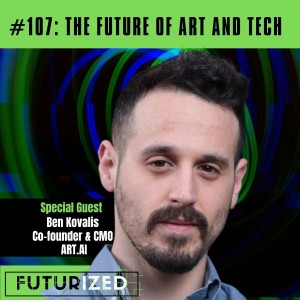
Tuesday Aug 17, 2021
The Future of Art and Tech
Tuesday Aug 17, 2021
Tuesday Aug 17, 2021
Ben Kovalis, co-founder and CMO at Art.ai, interviewed by Futurized's podcast host Trond Arne Undheim (@trondau), futurist and author.
In this conversation, they talk about what it means to use artificial intelligence to create one-of-a-kind artworks generated entirely by computer algorithms. How and when did it evolve? Does it complement or change art? Is it any different from previous technologies used to innovate artistic expression? What now?
Disclosure: Trond was gifted two AI generated artworks in order to prepare for this episode. The feedback he gets from those who see it is fascinating in itself.
After listening to this episode, check out:
- Art AI (@art_ai_official): https://www.artaigallery.com/
- Ben Kovalis (@Ben_Kovalis): https://www.linkedin.com/in/ben-kovalis/
Trond's takeaway: Art and tech have always been linked together by creative artists. Is there a difference when AI gets used in each stage of the artistic process and arguably somewhat independently of human hands? How important is the medium in conveying a message? How can technology and artistry rise above the technology itself if technology gets more and more autonomous? What would happen if society invested as much in AI art as in AI for social media or AI for industrial production? These questions are not resolved but are intriguing to ponder as we enter this puzzling decade.
Thanks for listening. If you liked the show, subscribe at Futurized.org or in your preferred podcast player, and rate us with five stars.
If you like this topic, you may enjoy other episodes of Futurized, such as episode 101, The Future of Consciousness, episode 68, Industrial-grade Mixed Reality, or episode 79, Futuristic AI.
To find us on social media:
- Instagram: https://www.instagram.com/futurized2/
- Twitter(@Futurized2): https://twitter.com/Futurized2
- Facebook: https://www.facebook.com/Futurized-102998138625787
- LinkedIn: https://www.linkedin.com/company/futurized
- YouTube: https://www.youtube.com/Futurized
- Podcast RSS: https://feed.podbean.com/www.futurized.co/feed.xml
Futurized—conversations that matter.
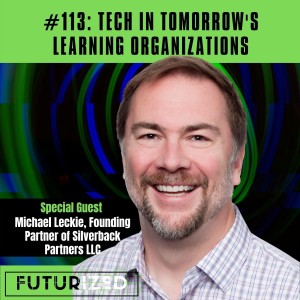
Tuesday Aug 10, 2021
Tech in Tomorrow's Learning Organizations
Tuesday Aug 10, 2021
Tuesday Aug 10, 2021
Michael Leckie, Founding Partner of Silverback Partners LLC, author of the new book The Heart of Transformation, published by Kogan Page, interviewed by Trond Arne Undheim, futurist and author.
In this conversation, they talk about how organizational change drives technology, behaviors of change--such as focusing on people's 3rds best ideas--and how to build organizational culture.
After listening to the episode, check out:
- The Heart of Transformation: https://michaelleckie.com/book
- Michael Leckie (@leckiemichaelj): https://www.linkedin.com/in/mjleckie/
Trond's takeaway: Organizational change is perhaps enabled by technology these days but tech has to be carried by people throughout the organization in order to reap the value and avoid being blinded by apparent quick fixes to difficult dynamics within human systems.
Thanks for listening. If you liked the show, subscribe at Futurized.org or in your preferred podcast player, and rate us with five stars.
If you like this topic, you may enjoy other episodes of Futurized, such as episode 93, Orchestrating the Freelance Economy, episode 91, Two Author-Podcasters Discuss Tech, or episode 94, Workforce, Humanity, and Future Tech. Did you know that you can also find Futurized on YouTube? You may enjoy our professionally produced long and short form clips from the podcast.
To find us on social media:
-
- Instagram: https://www.instagram.com/futurized2/
- Twitter (@Futurized2): https://twitter.com/Futurized2
- Facebook: https://www.facebook.com/Futurized-102998138625787
- LinkedIn: https://www.linkedin.com/company/futurized
- YouTube: https://www.youtube.com/Futurized
- Podcast RSS: https://feed.podbean.com/www.futurized.co/feed.xml
Futurized—conversations that matter.

Tuesday Aug 03, 2021
The Future of Freedom
Tuesday Aug 03, 2021
Tuesday Aug 03, 2021
Alex Gladstein is Chief Strategy Officer at the Human Rights Foundation, interviewed by Trond Arne Undheim (@trondau), futurist and author.
In this conversation, we talk about Decentralization, Bitcoin v Cash, Human Rights, surveillance states, digital authoritarianism, activism in a digital age, the mixed blessings of encryption, what it means to be an open society, currency neutrality and beyond.
After listening to the episode, check out:
- Human Rights Foundation (@HRF): https://hrf.org/
- Alex Gladstein (@Gladstein): https://www.linkedin.com/in/alexgladstein/
Trond's takeaway: freedoms need to be protected, one at a time, always, and as society and technology changes, more often that you would think. The future of freedom is only as bleak or bright as we ensure it will become through keeping a close watch.
Thanks for listening. If you liked the show, subscribe at Futurized.org or in your preferred podcast player, and rate us with five stars.
If you like this topic, you may enjoy other episodes of Futurized, such as episode 102, The Geotech Decade, episode 52, The Future of Peer-to-Peer, or episode 98, Free Speech on Social Media.
To find us on social media:
- Instagram: https://www.instagram.com/futurized2/
- Twitter(@Futurized2): https://twitter.com/Futurized2
- Facebook: https://www.facebook.com/Futurized-102998138625787
- LinkedIn: https://www.linkedin.com/company/futurized
- YouTube: https://www.youtube.com/Futurized
- Podcast RSS: https://feed.podbean.com/www.futurized.co/feed.xml
Futurized—conversations that matter.
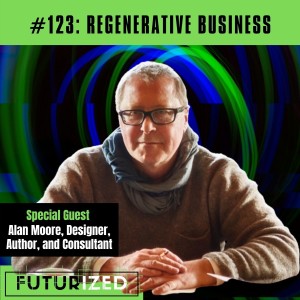
Tuesday Jul 27, 2021
Regenerative Business
Tuesday Jul 27, 2021
Tuesday Jul 27, 2021
Alan Moore, Designer, Consultant, and Author, interviewed by Trond Arne Undheim, futurist, investor, and author.
In this conversation, we talk about what regenerative business practices truly entail which is to go well beyond sustainability. We discuss how beauty gives us the oxygen needed and how we need to reclaim it, giving ourselves, as architects, designers, creators or innovators, the permission to think about that mysterious, awesome concept and reality of beauty.
After listening to the episode, check out Alan Moore's social media profile, his company Beautiful Business, and his most recent book, Do Build:
- Do Build (book): https://thedobook.co/products/do-build-how-to-make-and-lead-a-business-the-world-needs
- Alan Moore (@alansmlxl): https://www.linkedin.com/in/alanmoore2/
- Beautiful Business: https://beautiful.business/
My takeaway is that reclaiming the concept of beauty is transformational both on a personal and a planetary scale, but it cannot happen without introspection, courage, and the power of example. Wonder, joy, and walking in nature can approximate beauty and can give us the inspiration to pursue it in our professional lives. The effects would be healing for the planet, which seems really needed right now, objectively speaking.
Thanks for listening. If you liked the show, subscribe at Futurized.org or in your preferred podcast player, and rate us with five stars.
If you like this topic, you may enjoy other episodes of Futurized, such as episode 90, Upskilling Youth for the 21st Century Bioeconomy, episode 73, The Future of Social Learning, or episode 66, [The Serendipity of Social Innovation.
Futurized—conversations that matter.
To find us on social media:
- Instagram: https://www.instagram.com/futurized2/
- Twitter(@Futurized2): https://twitter.com/Futurized2
- Facebook: https://www.facebook.com/Futurized-102998138625787
- LinkedIn: https://www.linkedin.com/company/futurized
- YouTube: https://www.youtube.com/Futurized
- Podcast RSS: https://feed.podbean.com/www.futurized.co/feed.xml
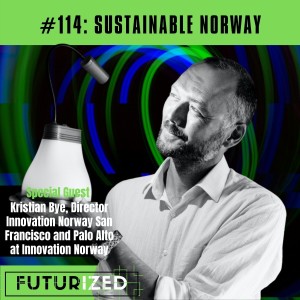
Tuesday Jul 20, 2021
Sustainable Norway
Tuesday Jul 20, 2021
Tuesday Jul 20, 2021
Kristian Bye, Director Innovation Norway San Francisco and Palo Alto, interviewed by Trond Arne Undheim (@trondau), futurist, investor, and author.
In this conversation, we talk about sustainable entrepreneurship, and the recent systemic innovation policy implemented by Norwegian strategy at a governmental level resulting in a focus on research and development, grants and funding that incent greentech innovation.
After listening to the episode, check out:
- Nordic Innovation House: https://www.nordicinnovationhouse.com/
- Innovation Norway: https://www.innovasjonnorge.no/en/start-page/
- Kristian Bye (@KristianBye): https://www.linkedin.com/in/kristian-bye-profile/
My takeaway is that [stimulating certain types of innovation at the governmental level is important and can be influential, but does not alone drive overall innovation in the same direction. Entrepreneurs think independently and cannot so easily be incentivized. But working with entrepreneurs in mind certainly helps although in Norway's case, the legacy of stimulating oil and gas production has been far more important and there is a lot of catch up to do to become a leading voice in sustainability. So, sustainable Norway may have both dollars and vision behind it now, but it will, in many people's minds, need to prove its transformational intent throughout this decade to be credible.]
Thanks for listening. If you liked the show, subscribe at Futurized.org or in your preferred podcast player, and rate us with five stars.
If you like this topic, you may enjoy other episodes of Futurized, such as episode 102, [The Geotech Decade], episode 70, [The Future of Cleantech], or episode 58, [Building the Southern California of Tomorrow].
Futurized—conversations that matter.
To find us on social media:
- Instagram: https://www.instagram.com/futurized2/
- Twitter(@Futurized2): https://twitter.com/Futurized2
- Facebook: https://www.facebook.com/Futurized-102998138625787
- LinkedIn: https://www.linkedin.com/company/futurized
- YouTube: https://www.youtube.com/Futurized
- Podcast RSS: https://feed.podbean.com/www.futurized.co/feed.xml

Tuesday Jul 13, 2021
The Future of Consciousness
Tuesday Jul 13, 2021
Tuesday Jul 13, 2021
Divya Chander, PhD, Neuroscientist, Nonresident Senior Fellow, Atlantic Council, interviewed by Trond Arne Undheim (@trondau), futurist, investor, and author.
In this conversation, we talk about how Divya Chander became a physician, neuroscientist, futurist, entrepreneur with the twin passions for exploring the brain and space. I ask her what dreams are. We discuss heightened states of awareness and get to the topic of consciousness: what is it and how to alter it? Divya gets into optogenetics: targeted activation or silencing of light-sensitive protein channels selectively expressed in neurons and how she uses the EEG waveform to monitor brain activity during anestesia. We talk about the Augmentation movement: who are they and what do they want? We explore the body's electric circuitry and eventually get to space travel within and beyond our solar system. Divya is helping to figure out how to create human hybernation and is also involved with SETI, the search for extraterrestrials. Finally, we discuss the need for regulation in outer space. I'll stop here, I think you just have to listen to the episode to find out more. It's a long one.
After listening to the episode, check out:
- Atlantic Council Geotech Center (@ACGeoTech): https://www.atlanticcouncil.org/programs/geotech-center/
- Divya Chander (@dchander): https://www.linkedin.com/in/divyachander/
Trond's takeaway: In outer space, and when space traveling humans come back, I shall fear humans more than the unknown, such as aliens. Beyond that, I find human augmentation both fascinating and frightening. It will undoubtedly happen, in fact, it is already happening. How soon? How extreme? What will the impact ultimately be? I quite enjoy talking to smart people who think about these things and are involved in shaping our future.
Thanks for listening. If you liked the show, subscribe at Futurized.org or in your preferred podcast player, and rate us with five stars.
If you like this topic, you may enjoy other episodes of Futurized, such as episode 84, The Origins and Future of Open Science, episode 79 on Futuristic AI, or episode 68 on Industrial-grade Mixed Reality.
Futurized—conversations that matter.
To find us on social media:
- Instagram: https://www.instagram.com/futurized2/
- Twitter(@Futurized2): https://twitter.com/Futurized2
- Facebook: https://www.facebook.com/Futurized-102998138625787
- LinkedIn: https://www.linkedin.com/company/futurized
- YouTube: https://www.youtube.com/Futurized
- Podcast RSS: https://feed.podbean.com/www.futurized.co/feed.xml
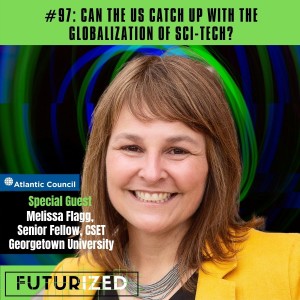
Tuesday Jul 06, 2021
Can the US catch up with the Globalization of Sci-Tech?
Tuesday Jul 06, 2021
Tuesday Jul 06, 2021
Melissa Flagg, Senior Fellow, Center for Security and Emerging Technology (CSET), Georgetown University, and Nonresident Senior Fellow at the Atlantic Council Geotech Center, interviewed by Trond Arne Undheim, futurist and author.
In this conversation, we talked about Melissa Flagg's upbringing in Missouri, her pharma PhD, road-trip in all 50 states, how she is currently trying to turn moonshine into gin, her shamanic journey, and her views on security, sci-tech, and defense innovation. Why does US policy pretend it is 1975? The decentralization of sci-tech globally and why has the US not noticed? Emerging security threats and challenges. Widening the scope of security threats to environmental challenges (pandemics, climate change). Finally, we discuss science and optimism.
After listening to the episode, check out
- CSET: https://cset.georgetown.edu/
- Melissa Flagg (@flaggster73): https://www.linkedin.com/in/melissaflagg/
Trond's takeaway "Sci-tech is in a global state but governments are still in their national state. How long can this last? Regions such as the EU have made great strides to internationalize funding and collaboration, so have many smaller, agile nation states. China is rising faster than almost anybody had predicted both in research dollars, number of researchers, and in specific, strategic domains such as AI. Can the US get away with not doing so? Can it still lead? Does it even currently lead? Many questions here, and a lot of change underway."
Thanks for listening. If you liked the show, subscribe at Futurized.org or in your preferred podcast player, and rate us with five stars. If you like this topic, you may enjoy other episodes of Futurized, such as episode 69 on the The Future of Quantum Security, episode 14 on Post-pandemic Tech, or episode 84 on The Origins and Future of Open Science.
Futurized—conversations that matter.
To find us on social media:
- Instagram: https://www.instagram.com/futurized2/
- Twitter(@Futurized2): https://twitter.com/Futurized2
- Facebook: https://www.facebook.com/Futurized-102998138625787
- LinkedIn: https://www.linkedin.com/company/futurized
- YouTube: https://www.youtube.com/Futurized
- Podcast RSS: https://feed.podbean.com/www.futurized.co/feed.xml
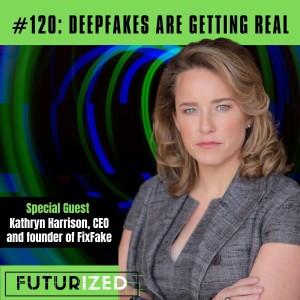
Tuesday Jun 29, 2021
DeepFakes are getting Real
Tuesday Jun 29, 2021
Tuesday Jun 29, 2021
Kathryn Harrison, CEO and founder of FixFake, and founder of Deep Trust Alliance, interviewed by Trond Arne Undheim, futurist and author.
In this conversation, we talk about fake news, content wars, cybersecurity, synthetic media, digital avatars, AR/VR, computer-generated imagery (CGI), AI-assisted video calls, fake celebrity porn videos, deep learning specifically Generative Adversarial Nets (GAN) and how people have been editing people’s faces on pictures since the internet started. To what extent is this just innovation and where does it get serious?
After listening to the episode, check out Deep Trust Alliance as well as Kathryn Harrison's social media profile:
- Deep Trust Alliance: https://www.deeptrustalliance.org/
- Kathryn Harrison (@KathrynHarrisn): https://www.linkedin.com/in/kathrynannharrison/
Trond's takeaway: "DeepFakes was until quite recently an esoteric topic. We had all seen innocent versions of it on playful apps, but I think many of us assumed it would be easy to tell the real thing. Not any more. The ramifications are enormous. We will soon not know what reality is. We cannot trust documentaries. We risk that others try to misrepresent us online--but also in the real world. What will this do to an already broken trust between people and media institutions? What happens to privacy? What happens to cybersecurity? We should count ourselves lucky that there are people like Kathryn Harrison watching our back. But is it enough? I'm left with more questions that when I started."
Thanks for listening. If you liked the show, subscribe at Futurized.org or in your preferred podcast player, and rate us with five stars.
If you like this topic, you may enjoy other episodes of Futurized, such as episode 102, The Geotech Decade, episode 69, The Future of Quantum Security, or episode 28, The Future of Child Trafficking.
Futurized—conversations that matter.
To find us on social media:
- Instagram: https://www.instagram.com/futurized2/
- Twitter(@Futurized2): https://twitter.com/Futurized2
- Facebook: https://www.facebook.com/Futurized-102998138625787
- LinkedIn: https://www.linkedin.com/company/futurized
- YouTube: https://www.youtube.com/Futurized
- Podcast RSS: https://feed.podbean.com/www.futurized.co/feed.xml
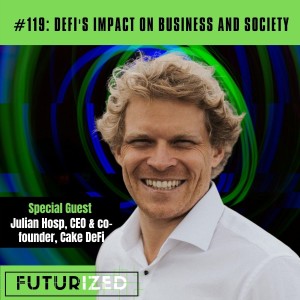
Tuesday Jun 22, 2021
DeFi's impact on Business and Society
Tuesday Jun 22, 2021
Tuesday Jun 22, 2021
Julian Hosp, CEO and co-founder of Cake DeFi, interviewed by futurist Trond Arne Undheim.
In this conversation, we talk about how DEFI emerged and what problems it fixes. We cover the problems in centralized finance—centralized control, limited access, inefficiency, lack of interoperability, and opacity. We then discuss the future of the DeFi industry.
After listening to the episode, check out Cake DeFi as well as Julian Hosp's social media profile:
Trond's takeaway: DeFi is now more than a niche phenomenon, it is already in the real world of finance, used for payment, currency creation, and credit scores. DeFi might just alter banking as we know it, but don't count out centralized institutions taking a key role in its rollout, since blockchain can serve many purposes, including contribute to maintaining the status quo.
Thanks for listening. If you liked the show, subscribe at Futurized.org or in your preferred podcast player, and rate us with five stars.
If you like this topic, you may enjoy other episodes of Futurized, such as episode 99, Blockchain uncapitalism on desktop PCs, episode 59, The Tokenization of Securities, or episode 44, The Future of Open Finance.
Futurized—conversations that matter.
To find us on social media:
- Instagram: https://www.instagram.com/futurized2/
- Twitter(@Futurized2): https://twitter.com/Futurized2
- Facebook: https://www.facebook.com/Futurized-102998138625787
- LinkedIn: https://www.linkedin.com/company/futurized
- YouTube: https://www.youtube.com/Futurized
- Podcast RSS: https://feed.podbean.com/www.futurized.co/feed.xml
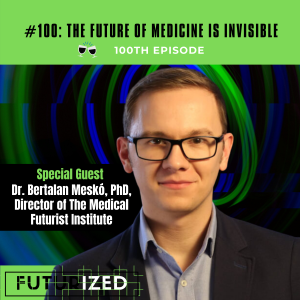
Tuesday Jun 15, 2021
The Future of Medicine is Invisible
Tuesday Jun 15, 2021
Tuesday Jun 15, 2021
Bertalan Meskó, Director of The Medical Futurist Institute, interviewed by Trond Arne Undheim, futurist and author.
In this conversation, we talk about the emergence of rapid healthcare transformation. Current best practices. We cover the many disruptive forces affecting medicine. How to track trends? What will medicine look like in the next decade? We discuss the advance of digital health and beyond. I find out how Bertalan tracks signals from sci-tech, startups, stakeholder dialogue, and visionary thinking and how he experiments on himself, testing out each medical innovation before recommending it or ever writing or speaking about it.
After listening to the episode, find out more about The Medical Futurist and check out Bertalan Meskó's social media profile.
- The Medical Futurist: https://medicalfuturist.com/
- Bertalan Meskó (@berci): https://www.linkedin.com/in/bertalanmesko/
Trond's takeaway: "Bertalan's notion that the future of medicine is invisible, seamless, and preventive is a great vision to have. In my own forthcoming book, Health Tech: Rebooting Society's Software, Hardware and Mindset, which is forthcoming on Routledge this fall, I make the point that the grand challenges of our time demand that we coordinate better than ever before. Shaping the future requires being aware of the opportunities and able to capitalize on them. That's where Bertalan is brilliant, making us all aware of the opportunities."
Thanks for listening. If you liked the show, subscribe at Futurized.org or in your preferred podcast player, watch Futurized Podcast on YouTube, and rate us with five stars.
If you like this topic, you may enjoy other episodes of Futurized, such as episode 88, The Future of Virtual Care, episode 82, The Future of Digital Health AI, or episode 55, AI for Medicine.
Futurized conversations—preparing YOU to deal with disruption.
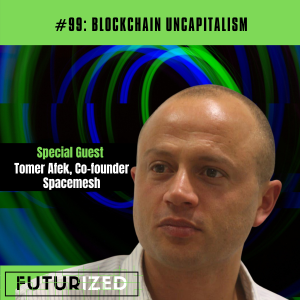
Tuesday Jun 08, 2021
Blockchain uncapitalism on desktop PCs
Tuesday Jun 08, 2021
Tuesday Jun 08, 2021
Tomer Afek, Co-founder of Spacemesh, the web-scale smart contract system that lets anyone run blockchain computation from home on their desktop PC, interviewed by Trond Arne Undheim, futurist and author.
In this conversation, we talk about how current methods for coin distribution, such as ICOs, airdrops, participation in mining pools and IEOs all have serious deficiencies and that the problem of providing extremely low barrier-to-entry remains as yet unsolved.
Instead the promise of blockchain is to create a cryptocurrency that is highly usable as means of payment between any two people in the world without any possibility of censorship. Spacemesh utilizes unused disk space on ordinary desktop PCs to run the network. Evening out the chances of the disadvantaged is what gives Tomer hope and purpose.
After listening to the episode, find out more about Spacemesh and check out Tomer Afek's social media profile.
- Spacemesh (@teamspacemesh): https://spacemesh.io/
- Tomer Afek (@tomerafek): LinkedIn
Trond's takeaway: "Cryptocurrency could be an answer to banking the unbankable, but that social stratification cannot typically be undone just by technology alone. As blockchain goes from free experimentation among the cyber libertarians and rapidly will become a business-to-business enabled platform, too, we need to keep a watchful eye on how those with few means can gain entry into the financial system. Web scale smart contracts and access to cryptocurrencies that don't require expensive computing resources or excessive computer talent, would seem to be a necessary ingredient."
Thanks for listening. If you liked the show, subscribe at Futurized.org, on YouTube, or in your preferred podcast player, and rate us with five stars.
If you like this topic, you may enjoy other episodes of Futurized, such as episode 42, The Future of Cryptocurrency, episode 66, The Serendipity of Social Innovation, or episode 59, The Tokenization of Securities.
Futurized conversations.
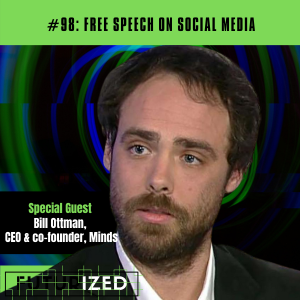
Tuesday Jun 01, 2021
Free Speech on Social Media
Tuesday Jun 01, 2021
Tuesday Jun 01, 2021
Bill Ottman, CEO & co-founder of Minds, an open source, crypto-based social network, interviewed by host Trond Arne Undheim, futurist, investor, and author.
In this conversation, we talk about how can we solve social media censorship issues and violations of free speech, but still filter out illegal content? What technologies are key to disrupting social network change for good? Censorship in the digital age. Platform control among big tech and how it is achieved at times to the detriment of privacy. We discuss Bill's notion of "extractive media". We discuss surveillance issues in "closed" media. We also discuss the emergence of alt media and crypto social media that respect privacy and try to reward creators.
After listening to the episode, find out more about Minds and check out Bill Ottman's social media profile.
- Minds: https://minds.com
- Bill Ottman: https://minds.com/ottman
Trond's takeaway: Free speech is a contentious issue on social media these days. The balance between free speech and censorship is a delicate one, and one that is never fully resolved. Whether it is legal, ethical, or commercial deliberations behind it, free speech is an ideal not a reality online. What constitutes hate speech? What good is censorship if questionable speech always finds an outlet? What is a fair business model for the future of social media? Is it time to truly break up big tech? What would we get instead? Many questions here, on Futurized we are not there to conclude, only to ask questions. There will be more questions in the time ahead.
Thanks for listening. If you liked the show, subscribe at Futurized.org or in your preferred podcast player, and rate us with five stars.
If you like this topic, you may enjoy other episodes of Futurized, such as episode 71, How To Fix Fake News?, episode 51, The Future of Peer-to-Peer, or episode 29, The Future of Computational Media.
Futurized—preparing YOU to deal with disruption.
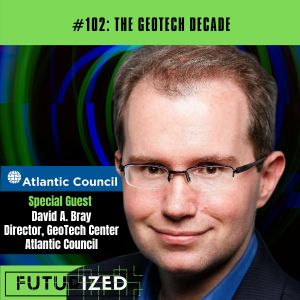
Tuesday May 25, 2021
The Geotech Decade
Tuesday May 25, 2021
Tuesday May 25, 2021
David A. Bray, Inaugural Director of the GeoTech Center at the Atlantic Council, the esteemed Washington DC-based think tank, interviewed by host Trond Arne Undheim, futurist, investor, and author.
In this conversation, we talk about the Report of the Commission of Geopolitical Impacts of New Technologies and Data (GeoTech Commission). The report, which will be released on May 26, provides an extensive set of recommendations for the United States and its like-minded allies to thrive in a decade defined by data and technology collaboration and competition. I ask David these questions and more: What is the Geopolitics of Tech? Why is this report and Commission important? What does the report recommend and how is this different from other Commissions? How does the Commission hope to socialize and scale its recommendations into tangible actions? What has the process of writing it looked like? What are the main recommendations? What are the implications for the next decade?
After listening to the episode, find out more about the GeoTech Commission's report, Atlantic Council, check out David A. Bray's profile on Singularity University or connect with him on LinkedIn.
- GeoTech Report 2021: https://www.atlanticcouncil.org/geotechreport (live as of 5/26)
- Geotech Commission: https://www.atlanticcouncil.org/programs/geotech-center/
- Singularity University https://su.org/about/faculty/david-a-bray/
- LinkedIn (dbray): https://www.linkedin.com/in/dbray/
- Atlantic Council (@AtlanticCouncil) https://twitter.com/AtlanticCouncil
- Atlantic Council https://www.atlanticcouncil.org/
Trond's takeaway: The GeoTech Commission has conducted great work. The recommendations, whilst perhaps not themselves groundbreaking, are each quite important, are communicated well, and would make great impact on the proactive role of the United States in the world of technology and risk at large, and would make one small step towards a better decade. I'm particularly thrilled by David's comment that this is destined as much towards innovators and entrepreneurs as towards governments and policymakers. That's what governance will take as we move more deeply into this decade. The important stakeholders are changing, the shapers of tomorrow are not the shapers of yesterday.
Thanks for listening. If you liked the show, subscribe at Futurized.org or in your preferred podcast player, and rate us with five stars.
If you like this topic, you may enjoy other episodes of Futurized, such as episode 48, The Future of AI in Government, episode 46 Parliamentary Tech and Hypertransparency, or episode 84 The Origins and Future of Open Science.
Futurized—preparing YOU to deal with disruption.
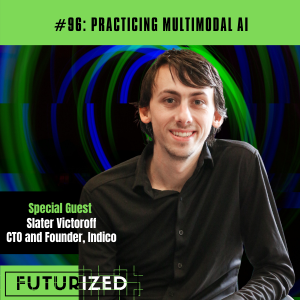
Tuesday May 18, 2021
Practicing Multimodal AI
Tuesday May 18, 2021
Tuesday May 18, 2021
Slater Victoroff, CTO and founder of Indico, the enterprise AI startup, interviewed by host Trond Arne Undheim, futurist, investor, and author.
In this conversation, we talk about how Slater was picking trash off of the Wellesley dump for school engineering projects, loves Chinese fantasy fiction Xianxia- with its immortal heroes, his experience at Techstars, founding a startup, and how startups beat juggernauts like IBM spending billions of dollars. We discuss how his company Indico practices multimodal AI, a set of blended techniques that make data sing. We muse about the future one where citizen data scientists contribute to better problem framing driven by subject matter experts.
Having listened to this episode, check out Indico's well as Slater Victoroff's online profile:
- Indico (@indicoData): https://indico.io/
- Slater Victoroff (@sl8rv): https://www.linkedin.com/in/slatervictoroff/
Trond's takeaway: The secret to making money with today's AI techniques seems to lie in blending various approaches, being able to handle a myriad of data sources, and meshing it together without losing the context and stumbling along making predictions that make sense even though the underlying dimensions are seldom fully understood, using transfer learning approaches. I would personally hope we could get a few steps further soon, so the explainability also increased. We will get there soon enough, I guess. Let's see if the technology is weatherproof and whether we can get there without another AI winter. I find it refreshing to talk with smart people who are also humble. That's why my bet will be on folks like Slater to build these systems for the future.
Thanks for listening. If you liked the show, subscribe at Futurized.org or in your preferred podcast player, and rate us with five stars. Check out @futurized2 on Instagram, @futurized2 on Twitter, or our YouTube channel at https://www.youtube.com/FuturizedPodcast
If you like this topic, you may enjoy other episodes of Futurized, such as episode 74, AI Talent Diversity, episode 79 Futuristic AI, or episode 48, The Future of AI in Government.
Futurized—preparing YOU to deal with disruption.

Tuesday May 11, 2021
Seed VC Trends: Founder Obsession
Tuesday May 11, 2021
Tuesday May 11, 2021
Tyler Norwood, Partner at Antler, the global early stage venture capital firm, interviewed by host Trond Arne Undheim, futurist, investor, and author.
In this conversation, we talk about how Tyler got into venture. We discuss betting on founders, teams and people. We cover the role of pivots, failures, and learning fast and slow. We discuss seed stage metrics, how to reduce risk, and how to ensure max upside. We spend some time on what it means to run a 'platform VC' and what best practice is (at Antler, Alpaca, others). What does the market look like? What's the seed investing outlook next decade? What are the differences between US and globally for VCs and startups?
Having listened to this episode, check out Antler as well as Tyler Norwood's online profile:
- Antler (@antlerglobal: https://www.antler.co/
- Tyler Norwood (@vacationronnie): https://www.linkedin.com/in/norwoodrt/
- Antler US (startups can submit): https://www.antler.co/usa
Trond's takeaway: Being a platform VC is a good way to go, because founders need all the help they can get, and money is not sufficient to provide from the early investor's side. Founders should become choosers, it's the only way to turn the tide for a more fair early seed stage experience for a diverse set of founders.
Thanks for listening. If you liked the show, subscribe at Futurized.org or in your preferred podcast player, and rate us with five stars.
If you like this topic, you may enjoy other episodes of Futurized, such as episode 70, The Future of Cleantech], episode 61, The emergent Arabian startup scene, or episode 47, How to Invest in Sci-Fi Tech?.
Futurized—preparing YOU to deal with disruption.
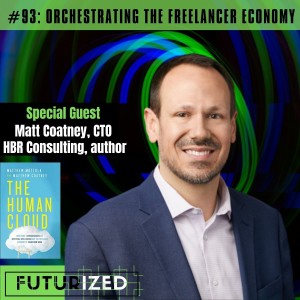
Tuesday May 04, 2021
Orchestrating the Freelance Economy
Tuesday May 04, 2021
Tuesday May 04, 2021
Matt Coatney, CTO at HBR Consulting, interviewed by host Trond Arne Undheim, futurist, investor, and author.
In this conversation, we talked about the book Matt Coatney co-authored, The Human Cloud: How Today's Changemakers Use Artificial Intelligence and the Freelance Economy to Transform Work. From routinized, repetitive assembly line work towards project oriented work--in all sectors. Enablers--AI, globalization, cloud platforms, shadow IT. Limitations-structure, regulations, organizational blockers. Future outlook: orchestration as the key human skill, industry- and task-specific cloud collaboration platforms.
My takeaway is that the freelancer economy is all about orchestrating people and technologies at a distance. This is not easy. As more and more intense and complex project oriented work takes place outside the remits of the traditional workplace, team, leadership and management skills need to increase in magnitude and quality. The sweet spot is where the enabling technology meets the challenges of human connection and productivity. The experimentation and the debate will only intensify in the years to come.
Having listened to this episode, check out HBR Consulting as well as Matt Coatney's online profile:
- HBR Consulting (@HBR_Consulting): https://www.hbrconsulting.com/
- Matt Coatney (@mattdcoatney): https://www.linkedin.com/in/mattcoatney/
Thanks for listening. If you liked the show, subscribe at Futurized.org or in your preferred podcast player, and rate us with five stars.
If you like this topic, you may enjoy other episodes of Futurized, such as episode 49 Living the Future of Work, episode 41 episode 41 The Future of Work or episode 78 The Next Generation Marketplaces.
Futurized—preparing YOU to deal with disruption.
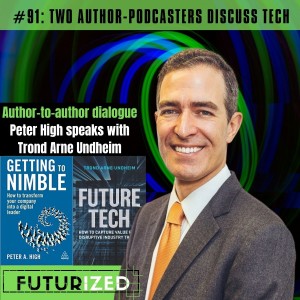
Tuesday Apr 27, 2021
Two Author-Podcasters Discuss Tech
Tuesday Apr 27, 2021
Tuesday Apr 27, 2021
Peter High, President of Metis Strategy, Host of Technovation podcast, and 3x author, interviewed by host Trond Arne Undheim, futurist and author.
In this conversation, we talk about how Peter High came to host of The Technovation podcast (2008-) and get into Enterprise IT. How Trond Undheim came to host the Futurized podcast (2020-). We discuss the new book by Peter High: Getting to Nimble--a framework and best practices companies can use to transform their people practices, processes, technologies, ecosystems, and strategies for the digital era (2021). We also discuss a new book by Trond Undheim: Future Tech: How to Capture Value from Disruptive Industry Trends (2021), which contains case studies of how to apply the forces of disruption framework and its components: tech, regulation, business models, social dynamics. Peter shares his secrets of podcasting: a podcast is an album--greatest hits get pulled through columns, books, speeches and combos. Finally, we discuss the future of enterprise & IT.
Having listened to this episode, check out Getting to Nimble, Future Tech, the Technovation and Futurized podcasts, as well as Peter High and Trond Undheim's online profiles:
- Getting to Nimble: https://www.amazon.com/Getting-Nimble-Transform-Company-Digital/dp/1789667550/
- Future Tech: https://www.amazon.com/Future-Tech-Capture-Disruptive-Industry/dp/1398600326
- Technovation podcast: https://www.metisstrategy.com/technovation-podcast/
- Futurized podcast: https://www.futurized.org/
- Peter High (LinkedIn, Twitter: @peterahigh): https://www.forbes.com/sites/peterhigh/
- Trond Undheim (LinkedIn, Twitter @trondau): https://trondundheim.com/
Trond Undheim: "My takeaway is that there is significant value in having frameworks to guide our thinking on change in organizations, business and society in the digital era. Where Peter focuses on the transformation of people, practices, processes, technologies, ecosystems, and strategies in his book Getting to Nimble, I focus on five components: tech, regulation, business models, social dynamics, and the environment in my book Future Tech--and indeed in this podcast, Futurized. As Peter and I discovered, there's significant overlap in our perspectives but we also come from very different places. Peter's audience is CIOs, my audience is broader, which makes him the smarter one in terms of targeting. I'm not sure who of us gets to have more fun, but I thoroughly enjoyed talking to Peter. One should be very fortunate to work with him, I think."
Thanks for listening. If you liked the show, subscribe at Futurized.org or in your preferred podcast player, and rate us with five stars.
If you like this topic, you may enjoy other episodes of Futurized, such as episode 49 on Living the Future of Work, episode 41 The Future of Work, or episode 41 The Future of Industrial Operations.
